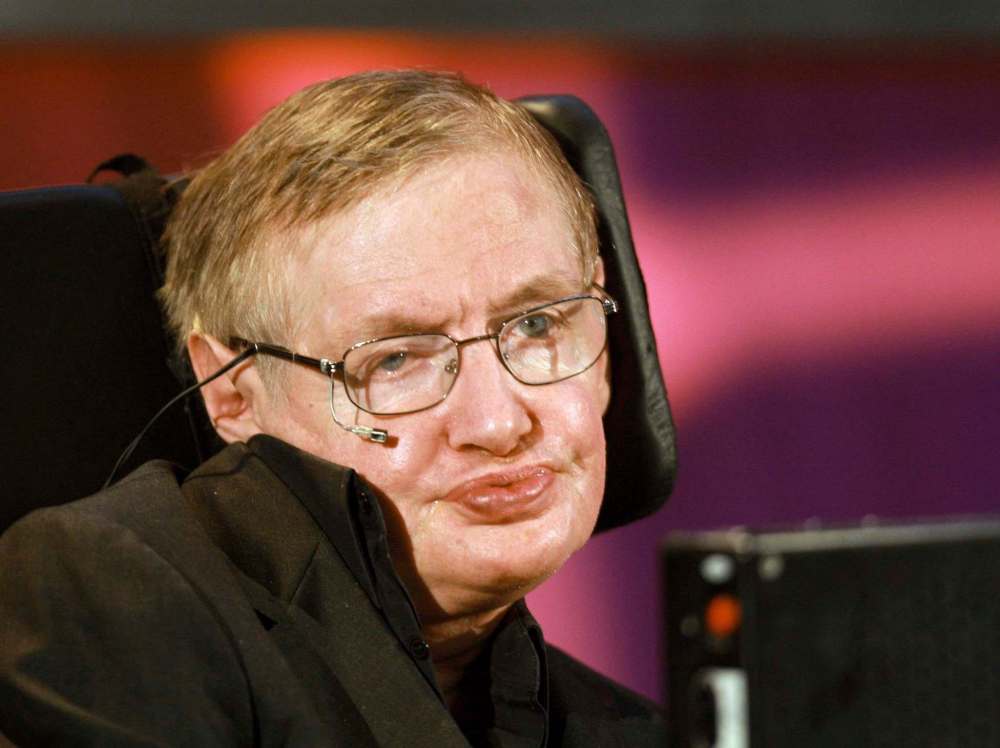Hawking’s contribution universal
Advertisement
Read this article for free:
or
Already have an account? Log in here »
To continue reading, please subscribe:
Monthly Digital Subscription
$1 per week for 24 weeks*
- Enjoy unlimited reading on winnipegfreepress.com
- Read the E-Edition, our digital replica newspaper
- Access News Break, our award-winning app
- Play interactive puzzles
*Billed as $4.00 plus GST every four weeks. After 24 weeks, price increases to the regular rate of $19.95 plus GST every four weeks. Offer available to new and qualified returning subscribers only. Cancel any time.
Monthly Digital Subscription
$4.99/week*
- Enjoy unlimited reading on winnipegfreepress.com
- Read the E-Edition, our digital replica newspaper
- Access News Break, our award-winning app
- Play interactive puzzles
*Billed as $19.95 plus GST every four weeks. Cancel any time.
To continue reading, please subscribe:
Add Free Press access to your Brandon Sun subscription for only an additional
$1 for the first 4 weeks*
*Your next subscription payment will increase by $1.00 and you will be charged $16.99 plus GST for four weeks. After four weeks, your payment will increase to $23.99 plus GST every four weeks.
Read unlimited articles for free today:
or
Already have an account? Log in here »
Hey there, time traveller!
This article was published 17/03/2018 (2907 days ago), so information in it may no longer be current.
Humanity benefits when we change our perspective, and it’s no terrible thing to be small in the grand scheme of things.
With the recent death of theoretical physicist Stephen Hawking, we can reflect on how much bigger our sense of both time and space has become over the last century.
We examine our place in the universe through religion, philosophy, art and science. No way of thinking necessarily excludes the other, though one discipline may force another to change its perspective.

At one time, religious and scientific authorities agreed the sun moved around the Earth. That was one perspective that fit with humanity seeing itself as the centre of the universe. Evidence and the work of scientists such as Galileo and Copernicus changed that. So did better understanding of chemistry and physics.
At a 1930 dinner party in honour of theoretical physicist Albert Einstein, playwright George Bernard Shaw gave a speech in which he said, “Ptolemy made a universe which has lasted 1,400 years. Newton also made a universe which has lasted 300 years. Einstein had made a universe… and I can’t tell you how long that will last.” As it turned out, Einstein’s theory of relativity not only made possible devices such as nuclear weapons, but also changed the way we think about the universe, space and time.
Later in the 20th century, and into the 21st, science had another brilliant thinker and popularizer of theoretical physics: Stephen Hawking.
Hawking was born in Oxford, England, in 1942. In 1963, at the age of 21, he was diagnosed with amyotrophic lateral sclerosis, a progressive degenerative disease. At the time, doctors gave him a life expectancy of two years; he outlived it by 53 years.
Hawking’s work on black holes, the origins of the universe and the nature of time might seem dense in detail to the layperson. But Hawking had a knack for speaking directly to not only those in his field, but also to those encountering scientific theories for the first time. His first book written for a general audience, A Brief History of Time, was a runaway bestseller after its release in 1988, selling 10 million copies over the next 20 years. (He followed it with a collection in 1993 called Black Holes and Baby Universes and Other Essays.)
Among his lifelong pursuits was a grand unified theory that would encompass electromagnetism and the strong and weak fundamental forces that govern nuclear interactions, and ultimately, a theory of everything that would encompass those as well as gravity. Along the way, through his writing, lectures and media appearances, Hawking strove to communicate the wonder of these ideas and to enlarge our understanding of the history of the universe, and its eventual fate.
Passionate about increasing our understanding of the universe, he once commented, “The greatest enemy of knowledge is not ignorance, it is the illusion of knowledge.”
Perhaps knowing one’s place in the cosmos lends a certain perspective. Hawking also once observed: “Life would be tragic if it weren’t funny.”
Hawking didn’t shy away from engaging with popular culture. He appeared as himself in an episode of Star Trek: The Next Generation, playing poker with Sir Isaac Newton and Albert Einstein. He also made appearances on The Simpsons, Futurama and, appropriately, given the title, The Big Bang Theory.
In a cheeky 2014 interview with comedian John Oliver, Hawking spoke about the threat of artificial intelligence as well as the possibility of parallel universes. Oliver asked, “Does that mean there’s a universe out there where I am smarter than you?”
“Yes,” replied Hawking. “And also a universe where you’re funny.”


